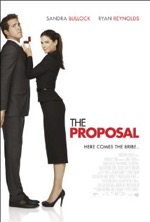The Proposal (PG-13)

Starring: Sandra Bullock
June 2009
“Jilts Its Audience with Standard Rom-com Shtick”
The Proposal, starring Sandra Bullock and Ryan Reynolds, is about two people who despise each other but eventually fall madly in love. We’ve seen this scenario a kajillion times before and have suffered through each permutation of the threadbare rom-com yarn with low interest and high anxiety to exit the theater as quickly as possible.
Director Anne Fletcher must’ve thought she’d struck gold in this new take on the ages-old form, if only because of the story’s exotic locale…Alaska. But, whereas location is everything in real estate, it can only take a movie so far, especially if it’s accompanied by a mediocre narrative. Sadly, we don’t get to see much of the Alaskan countryside in the film and when we do it’s either shoddily projected onto a green screen behind Reynolds or unimaginatively framed by Fletcher and her cinematographer. A few eagles factor into the story, but that’s the extent of the wildlife displayed in the movie—no bears and no moose…just Betty White in native Alaskan garb, dancing around a fire and chanting a string of vowels while worshiping Mother Earth. Guess that explains why there aren’t any animals in the movie.
The movie’s premise revolves around Bullock’s bulldog book editor Margaret Tate, who’s facing deportation to her home country, Canada…eh! In an act of desperation, Margaret grabs her assistant, Andrew Paxton (Reynolds), and convinces her boss and an immigration agent that she and Andrew are engaged—much to Andrew’s utter shock and revulsion. Andrew refuses to go along with the elaborate charade until Margaret promises him a promotion. The rest of the movie plays out like Meet the Parents in Alaska, with only a quarter of the silly mishaps and less than half the charm.
Bullock tries her hardest to invoke Meryl Streep’s Miranda Priestly from The Devil Wears Prada, but fails miserably, despite being called “it” or “witch” by her tweeting employees. However, though brusque and business minded, Margaret doesn’t resemble the harsh image painted by her skittish underlings. From a narrative perspective, it’s important that Margaret not be portrayed as too harsh because she has to be likable enough for audiences to cheer her on later in the story.
Andrew is a talented writer with aspirations of becoming editor, but he doesn’t know how to stand up for himself or stand up to Margaret and her frequently unreasonable demands. Andrew, on rare occasions, shows some chutzpah, but is ridiculously compliant for most of the movie. Ironically, as hard as it is for Andrew to say no to Margaret, he has no problem rejecting his father’s (Craig T. Nelson) continued pleas to come home and take over the family business. A puzzling inconsistency.
The film is buttressed by some decent supporting acting by Andrew’s parents (Nelson and Mary Steenburgen) and grandmother (White), but there’s nothing Oscar-worthy here. Ramone (Oscar Nunez), the town’s jack-of-all-trades—he’s a porter, grocer, adult entertainer and minister—provides some comic relief, but is actually more creepy than funny (the Chippendales striptease scene is one of the most disturbing sequences I’ve seen in a recent film and will surely be a turnoff for men and women of all persuasions). Ramone has several of the more amusing lines in the movie, but, like a cheap watch, his timing is always just a little off. The feeble chuckles generated during the faux outtakes at movie’s end are like the courtesy laughs you’d pay one of your grandfather’s corny jokes.
Though I must admit that The Proposal doesn’t have as many goofy gags as the typical comedy film, coaxed laughter is still the movie’s MO. Standard comedic gags, i.e., something tragic happens to a pet (here, an eagle carries off the family dog), a man accidentally knocks a woman overboard and one character schemes to get feuding lovers back together again (in this case White’s meddling grandmother fakes a heart attack so that the emergency helicopter can take them to the airport before Margaret flies back to the “Lower 48”), permeate the film. The promising premise laid out in the early stages of the film quickly devolves into a series of rom-com conventions, most significantly the “two people who weren’t meant to fall in love that miraculously do” plot device.
Besides the woefully underachieving story, the casting of the leads is the most ironic aspect of the movie. Bullock and Reynolds have very little chemistry as a romantic couple, which actually works well when they bicker and backstab their way through their fabricated relationship. When they finally realize that they really do love each other (something we’ve known all along), their lack of chemistry makes the contrived ending that much more improbable.
The series of ending “twists” are so predictable as to be embarrassing, and writer Pete Chiarelli consistently defaults to convenient solutions instead of more complex or, dare I say, realistic resolutions. Though I applaud the movie for largely eschewing the screwball moments that epitomize the vast majority of modern movies in this genre, The Proposal isn’t nearly as funny as you’d expect, making it an affair to forget. If someone invites you to see The Proposal, my advice would be the same as if they were offering you an illegal substance…just say no!
Rating: 2